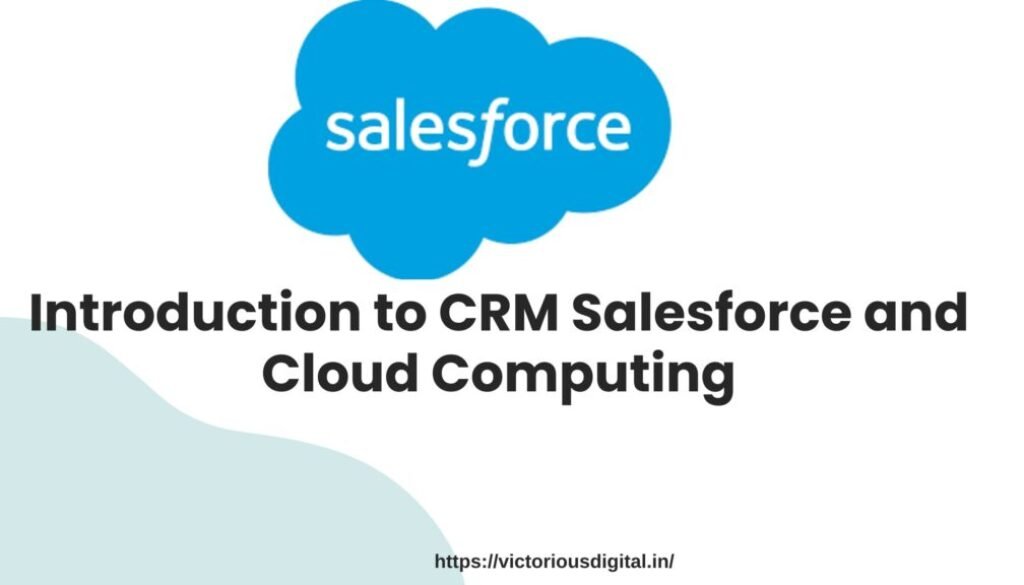Introduction to CRM Salesforce and Cloud Computing
In this article, we delve into the world of Customer Relationship Management (CRM), focusing specifically on the renowned CRM Salesforce and its intersection with cloud computing. As a leading provider of cloud-based CRM solutions, Salesforce has revolutionized the way businesses manage customer interactions, streamline processes, and drive growth. With its robust features and extensive capabilities, Salesforce has gained significant popularity among organizations of all sizes. So, let’s explore the power of CRM Salesforce and how it leverages the potential of cloud computing to enhance business operations and customer experiences.
Understanding CRM Salesforce
Customer Relationship Management, or CRM, refers to the strategies, practices, and technologies that organizations employ to manage and analyse their interactions with customers and prospects. CRM systems enable businesses to track customer data, enhance communication, automate sales processes, and provide personalized experiences.
Salesforce, a cloud-based CRM platform, offers a comprehensive suite of tools designed to help businesses build strong customer relationships. With its intuitive interface and customizable features, Salesforce empowers organizations to streamline their sales, marketing, and customer service efforts, resulting in improved productivity, increased revenue, and enhanced customer satisfaction.
The Power of Cloud Computing
Cloud computing has transformed the IT landscape, providing businesses with scalable, on-demand computing resources over the internet. By leveraging cloud infrastructure, organizations can access and utilize software applications, storage, and computing power without the need for extensive on-premises hardware and infrastructure investments.
Salesforce harnesses the power of cloud computing by hosting its CRM software on the cloud. This cloud-based approach offers several advantages, including:
Flexibility and Scalability: With Salesforce, businesses can easily scale their CRM solution as their needs evolve. Whether it’s adding new users, expanding functionalities, or integrating with other systems, the cloud-based nature of Salesforce ensures flexibility and scalability.
Accessibility: The cloud-based CRM can be accessed from anywhere with an internet connection, enabling sales teams to stay connected, collaborate, and access critical customer information on the go. This accessibility fosters productivity and empowers sales representatives to provide exceptional customer experiences.
Automatic Updates and Maintenance: Salesforce handles updates, patches, and maintenance tasks, alleviating the burden on internal IT teams. By automatically rolling out new features and enhancements, Salesforce ensures that businesses are equipped with the latest tools to drive success.
Enhanced Data Security: Salesforce invests heavily in ensuring data security and protection. By leveraging advanced encryption techniques, robust access controls, and stringent privacy measures, Salesforce provides a secure environment for storing and managing sensitive customer information.
Key Features and Benefits of Salesforce CRM
Salesforce offers a plethora of features and benefits that make it a compelling choice for organizations seeking a comprehensive CRM solution. Some of the key features include:
1. Lead Management
Salesforce enables businesses to effectively manage their leads by tracking and nurturing them throughout the sales cycle. From capturing leads to assigning and prioritizing them, Salesforce provides a centralized platform to streamline lead management processes, ensuring that sales teams focus on the most promising opportunities.
2. Sales Opportunity Tracking
With Salesforce, sales teams can efficiently track and manage their opportunities. By recording important details such as deal size, stage, and probability of closure, Salesforce empowers organizations to prioritize and strategize their sales efforts effectively.
3. Customer Service and Support
Salesforce offers robust customer service and support features, allowing organizations to deliver exceptional customer experiences. Through features like case management, knowledge base, and service level agreements (SLAs), businesses can efficiently handle customer inquiries, track issues, and provide timely resolutions.
4. Customization and Integration Capabilities
Salesforce provides extensive customization options, allowing businesses to tailor the CRM platform to their unique requirements. Moreover, Salesforce seamlessly integrates with a wide range of third-party applications, enabling organizations to create a unified ecosystem that enhances productivity and efficiency.
5. Analytics and Reporting
Salesforce’s robust analytics and reporting capabilities enable businesses to gain valuable insights from their customer data. Through customizable dashboards, reports, and data visualization tools, organizations can track key performance metrics, identify trends, and make data-driven decisions.
Conclusion
CRM Salesforce, powered by cloud computing, offers an array of features and benefits that empower organizations to manage customer relationships effectively, drive sales, and deliver exceptional customer experiences. By harnessing the power of cloud technology, Salesforce provides businesses with the flexibility, scalability, accessibility, and security needed to thrive in today’s competitive landscape.
As businesses continue to recognize the importance of customer-centricity, CRM solutions like Salesforce will play a crucial role in shaping the future of customer relationships and business growth.
If you want join salesforce classes in Pune & salesforce classes online please call us on 9545022110 & visit https://victoriousdigital.in




